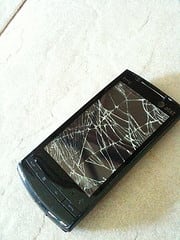
(Ninja M.)
“First of all, I’d like to say that everyone employed there who works on the phones knows that the process is often frustrating and maddening,” writes CJ, who adds that cursing a blue streak at the CSR probably won’t help. “We have no control over how long hold times are, how poorly an AT&T rep treated you, or how much your deductible is… In fact, yelling makes it a lot likelier that we’ll just speed through the process and possibly neglect to tell you critical information, such as documents that are required to get your claim approved or how long you have to complete your claim.”
With that out of the way, CJ provides the following info they believe will be helpful to anyone making an insurance claim with Asurion:
1. The Deductible Is Not Negotiable.
No matter what the AT&T store or even call center rep tells you, the Terms and Conditions override all that. No, your iPhone deductible is not $50, $100, or $125. Same goes for you Galaxy Note, Galaxy S III, or any other high-end phone. It doesn’t matter how little you paid for the phone, the deductible is not negotiable. That device you got for $99.99 on sale at the store came with a 2-year contract, which is the reason for that price. If you did not have a contract, you’d be charged the full sticker price for the phone, which in most cases (even for “cheap” phones) is several hundred bucks. In some cases, it may be cheaper to use an upgrade or cross-upgrade or even add an additional line than to file an insurance claim.
2. Be Aware Of Time Limits.
Unless you live in Missouri or Alaska, you have 60 days after the date of the incident OR the last time the phone malfunctioned to file your claim. If you live in either of the two aforementioned states, you have as long as you want, due to the laws of those states. You have 60 days after completing the claim to take ownership of the replacement device. As far as I knew, there were never any exceptions granted to those rules.
3. Know What Constitutes A Comparable Replacement Phone.
If the phone you were offered as a replacement is not comparable to the one you had before, tell the rep which features and functions it’s missing (and no, color is not a feature or function). If you have a particular phone in mind with those features and functions and it’s within the same tier, chances are you should be able to get that phone. In a few exceptional circumstances, you might be able to get a higher tier phone, BUT your deductible may be higher should you have to file a claim on the replacement device in the future. Under no circumstances will an Android phone be replaced with an iPhone even if the deductible of $199 is the same.
4. Know The Terms And Conditions Of Your Insurance.
These documents are boring but contain lots of useful information. For instance, if your phone is taken by the police, even if you were an innocent party, insurance won’t cover it. If you give your child/sibling/significant other a phone for them to use on a long-term or permanent basis and they don’t return the device, insurance won’t cover that as a theft because it’s considered a voluntary surrender. For tier 2 and tier 3 phones (high-end Android phones and all iPhones), if you have the device or if the device is found, you are required to return the device to Asurion or you will be charged the retail value of the non-returned device. Also, if you receive a tier 3 device from us and that device is damaged or unacceptable, you’ll be required to return that device and that device must show up as being received in the warehouse before another one will be shipped out to you.
5. Know When To Escalate Your Claim.
The front-line reps are trained to answer questions about claims (except denials, because we weren’t licensed adjusters, we legally couldn’t inform customers of claim denials) and process claims. While we have some latitude in our jobs, if your situation requires more attention, then ask for a supervisor. Front-line CSRs can’t proactively offer to transfer you to a supervisor. Make sure to document with whom you spoke (we couldn’t give out our last names, but we could give our ID #s) as well as any tracking numbers of devices you’ve sent back.
If there’s any dispute about a charge on your bill (like if you returned a device and still got charged for it, or if the claim was filed as a malfunction rather than a theft or loss) or you received the wrong device, those can be leverage when trying to get the situation straightened out. If you know something is up, just mentioning a lawsuit [Ed. Note: We generally do not recommend threatening a legal action just to speak to a supervisor], filing a complaint with the Better Business Bureau, or complaints to state agencies will work in your favor. The CSR will transfer you to someone with a lot more power and ability to resolve the situation in a satisfactory manner. Customers referred to this dept. often end up getting gift cards (they won’t comp you your deductible; not even they can do that) and free accessories.
Thanks to CJ for sharing this info. If you have any helpful information gleaned from on-the-job experience that you would like to share with Consumerist readers, e-mail us at tips@consumerist.com.
Editor's Note: This article originally appeared on Consumerist.
















